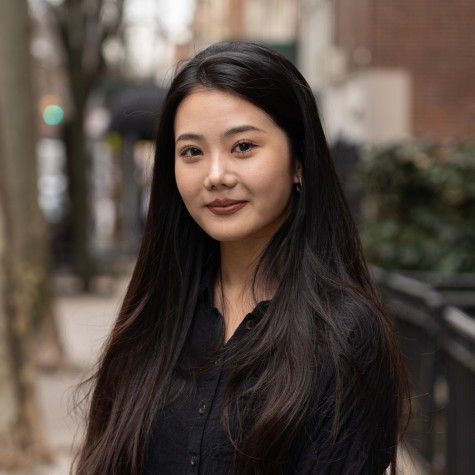NYU alum helps daughters become mothers
The finale in our series highlighting empowering NYU alumni in Women’s History Month
March 31, 2023
Jade Kearney: I felt like I couldn’t really be too emotional, like I had to hold it together because my mom, I’m the oldest of eight kids, and so my mom didn’t complain. Her mom didn’t complain. And I should not complain because I should be able, I should be able to handle this no matter what it is.
And really, in postpartum is when it all fell apart, and I thought, oh, my God, I can’t handle this shit. It’s like too much, but then I felt like I was failing at cultural norms of suffering in silence. Like you’re supposed to suffer quietly.
My name is Jade Kearney. My one daughter is 5. My other daughter is 2, and I had twins eight weeks ago, so they’re two months. I can say that my last two deliveries were amazing. I had all three of my babies with the same practice, but the first one I had an emergency birth because I had preeclampsia.
After I had my daughter, I had terrible postpartum anxiety and depression. So we all know about Black maternal morbidity, or if we don’t all know, Black maternal morbidity is an epidemic here in the United States. I experienced a lot of residuals of that epidemic, and I went to Margue (Marguerite Pierce) after getting better and going through my mom journey, and I asked her if she wanted to start the company with me. We both just so happened to have daughters one year apart and we both experienced postpartum on our own, so it just made sense that we took our friendship and like went to the next level in creating a partnership, which I think is beautiful because our daughters get to see us.
We provide Black mothers with a community where they can validate their experiences on our app. Culturally relevant resources such as events, research articles based on Black postpartum experiences, and then our wearable symptom tracker, where if a mom is experiencing something like preeclampsia or eclampsia or HELLP syndrome, she can track those symptoms through wearable technology. And then culturally competent providers. We train healthcare providers to be cultural, culturally competent to better, better meet the needs of Black mothers through our certification.
But the idea came from my own suffering and becoming a mom and the medical neglect and also cultural stigmas around suffering and shame. Black women don’t share birthing stories because so many of them are tragic and challenging, so there is a stereotype amongst, in the Black community, is strong Black mother or strong Black woman that a lot of us subscribe to, where we don’t talk about our own suffering. A lot of cultures of color don’t, and it can be deadly, really. If you scream at the top of your lungs forever, no one ever comes, you stop screaming.
I feel like the media has a way of dehumanizing us. So you’re hearing the stories of Black maternal morbidity, but you’re not seeing the moms. Do you ever see the moms? No. Do you see the babies? No. So what is it? What does it mean? You’re not putting a face, you’re not putting a heart to the problem. The media, everyone has to do a better job of humanizing us because it’s been centuries of dehumanization, so people don’t see themselves in us, and I am like a mom, just like your mom, just like anybody else’s mom.
I’ve had wonderful, beautiful experiences where I’ve brought my children to this world that I could share with my daughters and my sons. But for a lot of us, that’s not the situation. Like my postpartum period was terrible. I went to the emergency room 21 times. You don’t want to share that with your daughter. You should, but you really, because it shows weakness, you know, according to our, the cultural stigma, right? When she gets older, she’ll clearly be around while this is going on. And and I’ll share more and more with her, and hopefully Black maternal morbidity decreases wildly before she’s even thinking about having a child.
Contact Jennifer Ren at [email protected].
























































































































































